CRA-WP Program Infographics
Infographics created by the Center for Evaluating the Research Pipeline (CERP) that are relevant to the Committee on Widening Participation in Computing (CRA-WP). CRA-WP was formerly CRA-W, all references to CRA-W are a reference to this same committee.
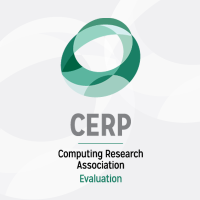
CERP Infographic: Where Are They Now? Exploring the Career Paths of Past Participants of Grad Cohort for IDEALS and Grad Cohort for Women
By Eniola Idowu, Research Associate, CERP The CRA-WP’s Grad Cohort for Women (GCW) and Grad Cohort for IDEALS (GC-IDEALS) workshops have significantly influenced the career trajectories of their participants. CERP summarized the career advancement of past GCW and GC-IDEALS attendees who have successfully earned their Master’s or Doctoral degrees using Data Buddies Surveys data (2018-2023), […]
View full article.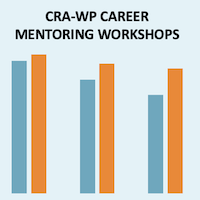
Snapshot Results from the CRA-WP Career Mentoring Workshops
Career Mentoring Workshops are designed to support individuals in early and mid-career stages. Evaluation results indicate that after the workshop, as compared to before the workshop, participants were more likely to report they knew people to whom they could go to for guidance on how to advance their career.
View full article.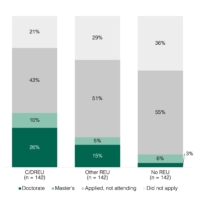
C/DREU Students Continue to Pursue a Graduate Degree in Computing at Higher Rates
Updated analysis shows that C/DREU participants are more likely to attend graduate school (36%) than students who participated in other REU programs (20%) and students who did not participate in an REU program (9%) at all.
View full article.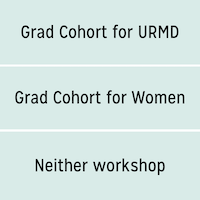
How Do the Grad Cohort Workshops Measure Up? Past attendees of both Grad Cohort for URMD and Grad Cohort for Women weigh in.
Past participants of both the Grad Cohort for URMD and Grad Cohort for Women workshops indicated which of the workshops provided participants with a number of benefits that relate to the goals of the program. Results indicate the majority believe both workshops provide attendees with many intended features.
View full article.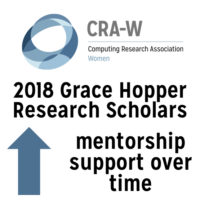
CRA-W Grace Hopper Research Scholars Report Stronger Mentorship Support After Attending the 2018 Grace Hopper Celebration Through the Program
CERP evaluated the 2018 CRA-W Grace Hopper Research Scholars program using a pre/post methodology, wherein program participants were surveyed prior to the event and then immediately following the conclusion of the Grace Hopper Celebration. Results indicate that program participants reported statistically significant increases in their perceived mentorship support.
View full article.
Participants in the CRA Grad Cohort for Underrepresented Minorities + Persons with Disabilities Report Stronger Professional Skills After Attending the Workshop
In 2018, CRA launched the Grad Cohort for Underrepresented Minorities + Persons with Disabilities (Grad Cohort URMD) workshop. CERP found that compared to before the workshop, participants reported stronger knowledge about a number of professional skills after attending Grad Cohort URMD. Applications for the 2019 workshop will open October 2018.
View full article.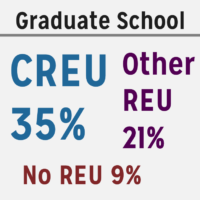
More CREU Students Attend Graduate School Compared to Other REU Students
This infographic compares post-graduation plans of undergraduate students with different REU (Research Experience for Undergraduates) experiences using CERP’s annual spring survey for graduating students. Specifically, CRA-W/CDC Alliance’s Collaborative Research Experiences for Undergraduates (CREU) participants, students who participated in other REUs, and students with no REU experience were compared in terms of whether they were attending graduate school (Master’s or Ph.D.) in the upcoming fall semester. The students included in this analysis are men from racial/ethnic groups who are underrepresented in computing and women because the CREU program is targeted specifically toward these students. Approximately the same number of women and men are in all three groups.
View full article.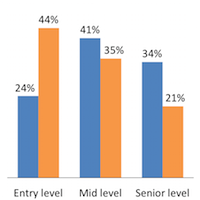
Nearly 10 Years Later, CRA-W Career Mentoring Workshop Participants are More Advanced in their Careers Than Non-Participants
CERP recently extracted Web data to observe the career progression of women who had participated in the CRA-W’s 2008 or 2009 Career Mentoring Workshops (CMWs) compared to a sample of women who had never participated in CMWs. We obtained the comparison sample from a population of women who earned their Ph.D.s in computer science during the same time period as the participants. We collected current career information including job titles (e.g., associate professor) and job setting (e.g., academia vs. industry/labs) for both groups. We then categorized job titles as entry level (e.g., assistant professor, software engineer), mid level (e.g., associate professor, senior engineer), and senior level (e.g., professor, principal program manager), collapsed across job setting. To test for a systematic difference in job rankings between workshop participants and the comparison group, we ran a 2 (Group) x 3 (Job Title Rank) Chi-squared test and found a statistically significant difference in rankings across the two groups, χ2 (2, N = 181) = 8.46, p < 0.05. Specifically, CMW participants were less likely than non-participants to be in an entry level position, p < .05, and more likely to be in a senior level position than non-participants, p < .05.
View full article.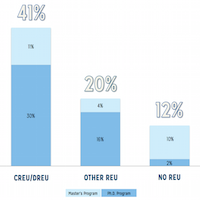
Twice as Many CREU/DREU Students Attend Graduate School, Compared to Other REU Students
During their final year in college, a sample of undergraduate computing majors completed CERP’s annual survey for graduating students. The sample contained past participants of the CRA-W/CDC Alliance’s Collaborative Research Experiences for Undergraduates (CREU) and Distributed Research Experiences for Undergraduates (DREU), students who had completed other REUs, and students who had never completed an REU. CREU/DREU participants were significantly more likely to report plans to attend a graduate program in computing in the upcoming fall, compared to students who had completed a different REU or no REU during college, p < .05. CREU/DREU students were also more likely to report that they were entering a Ph.D. program, compared to students with other REU experiences, or no REU experience, p < .05.
View full article.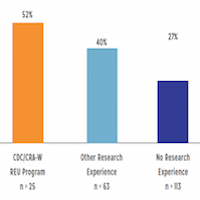
Racial/ethnic Minority Students Who are CDC/CRA-W REU Participants are Particularly Likely to Apply to a Graduate Program in Computing
A sample of racial/ethnic minority undergraduate students graduating with a computing major (n = 201) reported whether they had applied to a graduate program in the fall. Students who had participated in a CDC/CRA-W REU program were significantly more likely to have applied to graduate program in computing than their peers with no undergraduate research experience (p < .05). Among students who had other research experiences and students with no research experience, there was no difference in graduate school application rates (p = .13). Importantly, this analysis controlled for students’ college GPA and parental education level, indicating that participating in a CDC/CRA-W REU program predicted applying to a computing graduate program over and above GPA and parental education level.
View full article.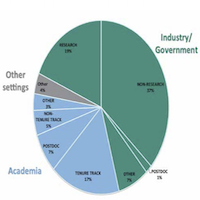
Where are they now?
Overwhelmingly, Grad Cohort women are employed in industry/government positions. In 2015, CERP followed up with women who had attended a CRA-W Grad Cohort Workshop between 2004 and 2012. Survey respondents (n = 371) provided the following current employment information: 70% were employed, 26% were graduate students, and 4% who were unemployed. Of those who responded that they were employed (n = 258), 64% indicated they were employed in an industry/government setting, 32% were in academia, and 4% in other settings.
View full article.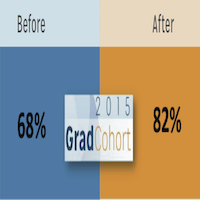
Terminal M.S. Students Who Participate in the CRA-W’s Grad Cohort Show Increased Interest in Pursuing a Ph.D.
During the spring of 2015, 63 Terminal Masters students who had participated in the CRA-W’s annual Grad Cohort mentoring event for women graduate students responded to the following: How interested are you in ultimately pursuing a PhD in a computing field? Respondents answer this question two weeks prior to and two weeks after Grad Cohort using the following scale: Not at all, A little, Somewhat, Quite a bit, Extremely.
View full article.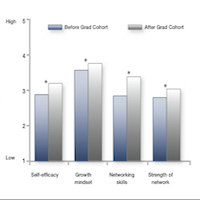
Grad Cohort and Student Skills
Grad Cohort is a two-day workshop that seeks to improve the success and retention of women in computing research by advising graduate students in computing on research skills and on career planning and development. Grad Cohort seeks to meet these goals using presentations, panels, and individual mentoring, and by creating professional social networks. Participants (N = 162) completed surveys prior to and immediately following the workshop. Findings suggest that Grad Cohort had a positive influence on participants’ self-reported outcomes. Participants reported greater self-efficacy, greater tendency to interpret setbacks as opportunities for growth (i.e., growth mindset), stronger networking skills, and a stronger network of colleagues after attending Grad Cohort than before. The complete Evaluation Report can be viewed at cra.org/cerp/evaluation-reports.
View full article.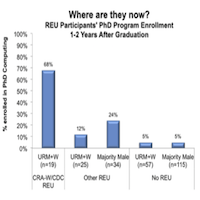
Where are They Now? REU Participants
We administered a post-graduation survey to students 1-2 years after they had earned their B.S. in computing to assess their current career status. Survey respondents were more likely to be enrolled in a PhD computing graduate program if they had participated in a CRA-W/CDC-sponsored Research Experience for Undergraduates (REU) than if they had participated in Other REUs or No REUs, p < .05.
View full article.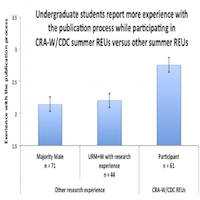
CRA-W/CDC Summer REU Programs Report More Experience With Publication Process
Undergraduate students who had participated in summer REUs were asked about the degree to which they obtained experience with the publication process while engaged in those REUs. Participants in CRA-W/CDC summer REU programs indicated that they had obtained significantly more experience with the publication process than students who had taken part in other summer REUs, p ≤ .05. Click here for full details.
View full article.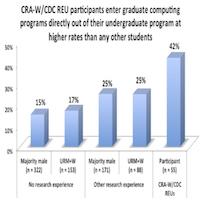
CRA-W/CDC REU Participants Plan to Enter Graduate Programs at a Higher Rate
Two samples of undergraduate students graduating with computing majors indicated their plans for the fall; data were collected during the spring of 2011 and 2012. CRA-W/CDC REU participants indicated that they planned to enroll in a computer science graduate program in the fall at a higher rate than any other type of students, p ≤ .05.
View full article.



